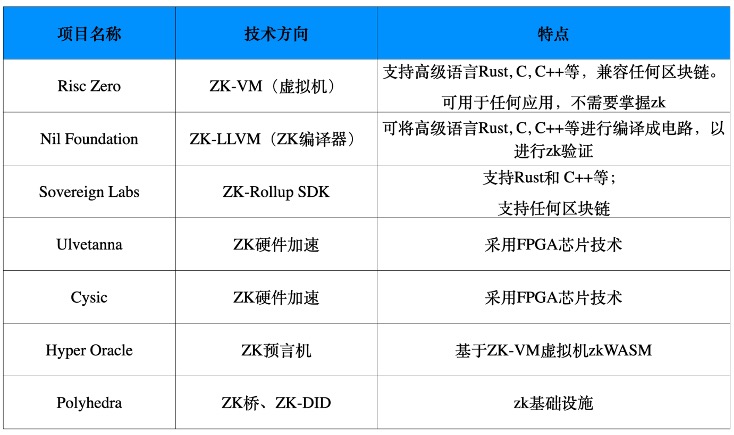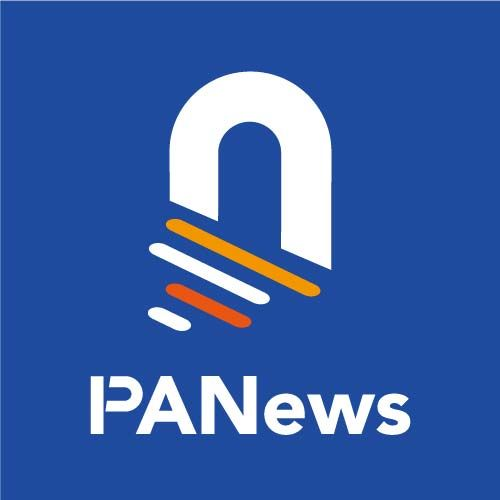最近の ZK トラックで注目に値する主要な資金調達プロジェクトを概観
最初のレベルのタイトル
ZK、ZK-VM、ZK-EVM
ZK トラックの各プロジェクトの背後にある技術的特徴を理解するために、まず ZK に関連する基本概念を理解しましょう。
ZKP (Zero Knowledge Proof) はゼロ知識証明の略で、主にデータを開示せずにデータの正しさを検証する認証者と検証者を通じて、数学的暗号化を通じてブロックチェーンのプライバシーと拡張の問題を解決することを指します。
ZK-VMは、ゼロ知識証明ZKと仮想マシンVM(Virtual Machine)を組み合わせたゼロ知識証明ベースの仮想マシンです。 ZK-VM は一般に 2 つの重要なコンポーネントで構成されます: 1 つは C++ や Rust などの高級言語を ZK システムが証明する中間式 (IR) にコンパイルできるコンパイラー (Compiler)、もう 1 つは命令です。 set Framework ISA (命令セット アーキテクチャ) とは、主に CPU の動作を指示する命令セットであり、CPU の動作を誘導するために使用される一連の命令セットです。
最初のレベルのタイトル
最近の ZK は注目に値する新たな資金調達プロジェクトを追跡しています
Nil Foundation
Nil Foundation完全な名前は「=nil; Foundation」ですが、これは少し意味不明ですが、実際、この奇妙な名前は SQL インジェクションのジョークに由来しています。
2018 年に設立された Nil Foundation は、データベース管理システムとしてスタートしました。昨年末には、Polychain Capital が主導し、Blockchain Capital、Starkware、Mina Protocol、IOSG Ventures の参加により、評価額 2 億 2,000 万米ドルで 2,200 万米ドルの資金調達を完了しました。
Nil Foundation は、LLVM に基づいた ZK 回路コンパイラーを構築しました。これは、C++ や Rust などの高級言語で書かれたプログラムを、ZK システム証明用の適切な中間表現 (IR) にコンパイルできます。つまり、Nil Foundation は回路コンパイラーであり、仮想マシンではありません。
LLVM (LowLevelVirtualMachine) は、Rust や C++ などの高級言語で書かれたプログラムのコンパイルと実行時間を最適化できる、フレーミング コンパイラー用のフレームワーク システムです。 LLVM は、2000 年にイリノイ大学の Chris Lattner 博士によって最初に開発されました。 Chris Lattner 氏は 2006 年に Apple に入社後、LLVM の開発システムへの適用に注力し始め、現在では Apple、Microsoft、Google、Facebook などの大手企業で LLVM が採用されています。
さらに、Nil Foundation は「Proof Market」を設立しており、ユーザーはハードウェアを所有する人にお金を払って検証してもらうことができ、証明者はお金を払ったユーザーの証明を競うことができます。計算的には、この自由市場の力学により、証明者は最も価値のある証明タスクを最適化できるようになります。
Sovereign Labs
ZK-Rollup SDK の構築に重点を置くSovereign Labs同社は1月にHaun Venturesが主導し、Maven 11、1KX、Robot Ventures、Plaintext Capitalが参加した740万ドルのシードラウンドを完了した。
Sovereign Labs は、開発者が安全で相互運用可能なゼロナレッジ ロールアップを作成できるようにするソフトウェア開発キット (SDK) を構築する予定です。 Cosmos SDK がレイヤー 1 の作成を簡素化するのと同じように、Sovereign SDK は ZK ロールアップの作成を簡素化することを目的としています。これは、ゼロ知識の複雑さを解消する初の集約フレームワークであり、開発者が暗号化の専門家でなくてもアプリケーションを簡単に構築できるようになります。 Sovereign SDK を使用すると、開発者は慣用的な Rust (または C++) でアプリケーションを作成できるようになり、SDK がアプリケーションを効率的な ZK 仮想マシンに自動的にコンパイルします。
Sovereign Labs のロードマップは 3 つの部分に分かれており、第 1 段階では、2023 年の第 2 四半期に研究設計のプロトタイプが完成します。現在のプロトタイプには、データの可用性のために Celestia が統合され、証明のために Risc 0 が統合されています。第 2 段階は、ピアツーピア ネットワーク、RPC ノード、コア API、デフォルトのストレージおよび順序付けモジュールを含む Sovereign SDK の展開です。 3 番目の段階では、コードのクリーンアップ、テスト、ファジング、監査を実施します。
Ulvetanna
Ulvetanna ゼロ知識証明 (ZKP) 生成の効率を向上させるハードウェアを構築するスタートアップが、Bain Capital Crypto と Paradigm が共同主導し、Jump Crypto の参加により、評価額 5,500 万ドルで 1,500 万ドルのシードラウンドを完了しました。
Ulvetanna は ZKP の生成プロセスを高速化するように設計されたハードウェアを構築しており、Ulvetanna のチームには Coinbase、Microsoft、Intel のプログラマーとエンジニアが含まれています。
ZKP の需要が今後増加するにつれて、ZKP は多くの計算を必要とし、強力なハードウェアが必要となり、大量の電力を消費します。 Ulvetanna は、専用設計のハードウェアでは ZKP 生成がはるかに効率的であると信じているため、応用暗号学者、ソフトウェアおよびハードウェア エンジニア、データ センターおよびクラウド アーキテクト、暗号ネイティブ投資家からなる経験豊富なチームを編成し、これらを組み合わせて効率的な ZKP ハードウェア コンピューティング サービスを提供します。暗号化とハイパフォーマンスコンピューティング。
Cysic
ZKハードウェアの起動CysicPolychain Capital が主導し、Hashkey、SNZ Holding、ABCDE、Web3.com Foundation などの他の投資家とともに、2022 年 12 月に 600 万ドルのシードラウンドを完了しました。
Cysic は、ZK 証明用のハードウェア アクセラレーション ソリューションを提供することを目指しています。現在の Cysic パートナーには、Scroll、Nil Foundation、Hyper Oracle が含まれます。
Cysic チームは、Multiscalar Multiply (MSM) の FPGA プロトタイプを開発しました。MSM は、CPU および GPU チップに似たプログラム可能なハードウェアの形式です (CPU 上で MSM を実行するよりも電力効率が低くなります)。
Hyper Oracle
ZKオラクルネットワークHyper Oracle最近、dao 5とSequoia China Seed Fund、続いてForesight VenturesとFutureMoney Groupが共同主導した300万ドルのシードラウンドを完了した。
Hyper Oracle は、セキュリティ、分散化、計算の整合性、パフォーマンスの観点からブロックチェーン ミドルウェアの課題を解決するために、ZK ミドルウェア プロトコルと、zkWASM 仮想マシンに基づく ZK オラクル マシン zkOracle を開発しています。
Polyhedra
最近の ZK インフラストラクチャ スタートアップPolyhedra Network Binance Labs と Polychain Capital が共同主導し、Animoca Brands と Dao 5 も参加して、1,000 万ドルの資金調達ラウンドを完了しました。
Polyhedra は現在、ZK テクノロジーに基づいて 3 つの ZK 製品を開発しています: L1 および L2 資産送信用の ZK ブリッジ (zkBridge)、ゼロ知識証明テクノロジーを使用してプライバシーを保護するユーザー ID ソリューション ZK-DID、プログラム可能な NFT プロトコル ZK- NFT、この製品はゼロ知識証明技術を使用してユーザー資産のプライバシーを保護します。現在、zkBridge テスト ネットワークが開始されています。さらに、Polyhedra は、大規模な分散プルーフ生成ネットワークを使用して ZK ロールアップを高速化できる、ParaPlonk と呼ばれるスケーリング ソリューションも開発しました。 Polyhedra は、より多くのブロックチェーンを統合し、開発者が API および SDK ツールを通じて簡単にアクセスできるようにして、より多くの ZK ロールアップ開発者を引き付けることを計画しています。
RISC ZERO
RISC Zero(資金調達情報は未発表) はオープンソースの汎用 ZK-VM で、プロジェクト名は人気の RISC (縮小命令セット コンピュータ) に由来しており、RISC Zero は最新の第 5 世代 RISC-V を採用しています。 RISC-V 命令セットのアイデアは、40 以上の命令セットのみを含む削減された命令セットを最大化することです。 RISC-V 命令セットのおかげで、RISC Zero は C++、Rust、Go などの高度なプログラミング言語をサポートしており、開発者は新しい言語を学習することなく ZK-VM を使用できます。
RISC Zero 製品成長担当副社長のマナシ (元 Uniswap 成長ディレクター) は、RISC Zero は Solidity もサポートするため、RISC Zero はネイティブ イーサリアム開発者にとってよりフレンドリーになると述べました。言語コンパイルに関しては、RISC ZERO は多くの大手メーカーが使用している LLVM アーキテクチャを採用しています。技術的なルートの観点から見ると、比較的成熟したコンパイルおよび命令セット ソリューションが採用されているため、RISC ZERO は ZK-VM トラックの典型的なプロジェクトになる可能性があります。

ZKトラックの開発方向性
昨年の ZK トラックのプロジェクトは、Starknet、zkSync、Scroll、その他の人気プロジェクトなど、イーサリアムと互換性のある ZK-EVM に主に焦点を当てていました。最近資金提供された ZK プロジェクトの種類から判断すると、それらは基本的に、ZK 回路コンパイラー、ZK ハードウェア アクセラレーション、ZK オラクル、ブリッジなどのインフラストラクチャ レベルに基づいています。
同時に、これらのプロジェクトも傾向を示し、ZK-VM プロジェクトの数が増加し始めました。実際、ZK 証明システムを導入することにより、ZK-VM は、多数の Web2.0 アプリケーションがゼロ知識証明を組み合わせて Web3 に参入できるようにすることができます。たとえば、ユーザー データを管理する現在の Gamefi バックエンド サービスは一元化されていますが、バックエンドで ZK-VM を使用すると、ゲームは真の分散化を実現できます。同様に、多くの Web2.0 アプリケーションは必要に応じて分散化できます。
ZK-EVM と ZK-VM のどちらが未来ですか? Ethereum 上のアプリケーションは段階的に ZK-EVM をサポートしますが、ZK-VM はより高度な言語をサポートし、ZK-EVM よりも構築が簡単であるため、Web3 は Ethereum に限定されません (ZK-VM は成熟したコンパイラーと命令セット アーキテクチャを使用できます)。 、ZK-VM も Solidity をうまくサポートできれば、ZK-VM は Web3 の未来になるかもしれません。



